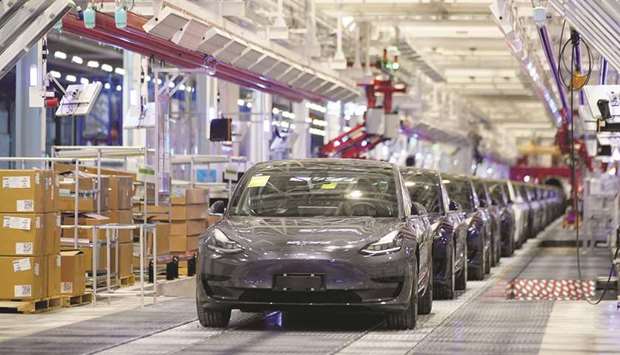Tesla Inc plans to ship cars made at its Shanghai factory to other countries in Asia and Europe, according to people familiar with the matter, shifting its strategy for the plant to largely focus on supplying the local market.
China-built Model 3s for delivery outside the country likely will start mass production in the fourth quarter, the people said, asking not to be identified because the details are private. They said the markets targeted include Singapore, Australia and New Zealand, as well as Europe. Shipments could start as soon as the end of this year or early 2021, according to the people.
The move is a turnabout from the plan Elon Musk communicated when Tesla broke ground and was constructing the Shanghai factory in 2019. The chief executive officer said then that the facility would only make lower-priced versions of the Model 3 sedan and Model Y crossover for the Greater China region, and predicted there would be enough local demand to potentially necessitate several factories in the country.
While the Shanghai plant has helped Tesla grow in China this year, it hasn’t expanded as quickly as some expected. The company has said it has the capacity to produce 200,000 vehicles a year – almost 17,000 a month – and in August sold about 11,800 cars in the country.
Tesla’s pivot to export from China and its build-up of inventory may signal demand is below capacity, Dan Levy, an analyst at Credit Suisse, wrote to clients. A representative for Tesla in China declined to comment.
The world’s biggest maker of electric vehicles is stepping up production as competition in the space intensifies, with traditional automakers starting to make EVs especially for the China market, where local rivals including BYD Co already have a strong footing. General Motors Co said this week it will take a $2bn equity stake in electric truck maker Nikola Corp.
Tesla’s main factory is in Fremont, California, where it assembles the Model S, X, Y and 3. The company is also building a factory in Berlin, its first in Europe. That plant is slated to start production in the summer of 2021.
Demand for EVs globally is rising, bolstered by tighter emissions regulations in Europe and an increasing awareness of climate change and the negative impact fossil-fuelled cars have on the environment. While the coronavirus pandemic has dented sales of all vehicles – global passenger EV sales were down 15% in the second quarter – the market for EVs is forecast to expand about 7% this year.
Europe has led the growth in 2020, with EV sales in the continent’s main auto markets more than doubling in January to July compared with the same period in 2019, according to BloombergNEF. Renault SA’s Zoe has dominated, and Tesla is also facing competition from Volkswagen AG and BMW AG’s new electric models.
“Exporting Model 3s to Europe would take advantage of China’s lower production cost base in a bid to improve profitability,” said Michael Dean, a Bloomberg Intelligence analyst. “It would follow BMW, who will soon begin exporting its new iX3 BEV from the region.”
While Tesla’s sales are increasing in several European countries, its total share remains small. In Germany, Europe’s biggest auto market, Tesla sold just over 8,000 cars in the first eight months of 2020 for a market share of 0.5%. That compares with some 327,000 cars sold by the main VW brand, and about 180,000 vehicles sold by Daimler AG’s Mercedes. In a bid to grow in Europe, Tesla is expanding its charging infrastructure and its Berlin factory is expected to assemble as many as 500,000 cars a year.
EV adoption in Singapore, Australia and New Zealand, meanwhile, has trailed Europe and China, and could present a bigger challenge. Tesla may also need to make changes to its assembly set-up in Shanghai to target those right-hand drive countries.
In China, Tesla delivers around 11,000 cars a month, all for the domestic market. Upstart NIO Inc has been averaging around 3,500 recently, by comparison.

Tesla China-made Model 3 vehicles are seen during a delivery event at its factory in Shanghai (file). Tesla Inc plans to ship cars made at its Shanghai factory to other countries in Asia and Europe, according to people familiar with the matter, shifting its strategy for the plant to largely focus on supplying the local market.
